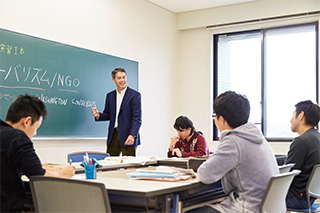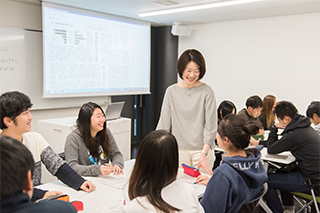- HOME
- DEPARTMENTS
- Faculty of International Relations
Faculty of International Relations

Working for Better Relations between Countries: Practice-Based Learning and Discussions Overseas
There are many international problems that cannot currently be solved by one country alone, such as global warming, refugees, the wealth gap, and poverty. For this reason, there is a need for quality human resources that can objectively understand and analyze international circumstances and work to solve them. In the Faculty of International Relations, students will not only acquire a rich education and advanced English-language skills, but also the knowledge that enables them to understand international politics and the world economy, as well as the historical and cultural conditions of each country. Quality human resources can be cultivated to have a sense of the realities on the ground overseas, and while keeping in mind the realities and ideals of international relations, be able to analyze the world today so as to contribute to the peace and welfare of humanity as a whole.
Learning Highlights
Understand the World from a Social Science Perspective with English
To flexibly understand our diverse world from a social science perspective—be it Europe, United States, Asia, Oceania, South America, the Middle East, Africa, or elsewhere—the ability to study, think about, and discuss the social sciences in the world’s shared language of English is indispensable. Therefore, in addition to the English subject “Business English” in which students learn vocabulary and ways of thinking necessary in business and international negotiations, many lecture subjects are offered in which students learn specialized content related to international relations and the social sciences in English. The ability for students to understand a bird’s eye view of the world without adopting a Japanese or Western-centric perspective will also be cultivated.
Overseas Topic Surveys Research Subjects: From the First Year
In their first year, all students will participate in overseas field research for approximately three weeks. By engaging in surveys of topics overseas, the students cultivate specialized knowledge and language abilities. By participating in international career development research from their second year onwards, students will experience the realities of international cooperation and companies, as well as work and entrepreneurship in Southeast Asia.
Discussion-Based, Small-Size Active Learning Classes
Classes are offered in which the students engage in active learning themselves. Centered on practicums, small classes of approximately 20 students engage in group work and discussions as well as give presentations. Practical subjects taught by outside lecturers invited from private companies and public agencies are also held.
Course Information
International Relations Politics Course
Identify Problems between States and Seeking Amicable Relations
How do the world’s nearly 200 sovereign states cooperate while pursuing their own particular benefit? Students will acquire the knowledge and analytical abilities necessary for engaging in such problems, as well as think about the inter-state dynamics in international politics. This course is suited for individuals who want to be active in diplomacy or international exchange as national or local government employees.
International Relations Economics Course
Understanding the Global Economy and Thinking about Japan’s Economic Development
Japan is faced with the issue of finding a stable path to growth while responding to global developments. In this course students will comprehensively understand the dynamic changes in the global economy and the structure of domestic industry and consider the future development of the Japanese economy. This course is best suited for individuals who want to be active in foreign-owned companies or Japanese companies that are expanding globally.
International Relations Co-Existence Course
Analyzing Issues in the International Community and Working out Solutions with Co-existence in Mind
Students will analyze the complicated issues in the international community that have spread around the world along with globalization, such as refugees and poverty, from various viewpoints. Students will attempt to work out solutions to these problems with an eye to co-existence between various peoples, as well as search for new possibilities. This course is geared toward students who wish to work in public agencies, private groups, companies, NGOs, and other organizations involved in developmental assistance for developing countries, international cultural exchange, and international cooperation.








